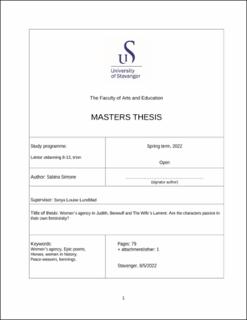| dc.description.abstract | Protagonists or main characters are the center of a story. The plot revolves around these characters, and the readers are influenced to see the story and events through their perspectives. Using New Formalist theory and new scholarly readings about women’s agency in Old English poetry, this thesis focuses on three female protagonists, Judith from Judith, Wealtheow from Beowulf and the woman speaker in The Wife's Lament. I will analyze these characters’ power and agency within the poems and discuss their role within the society they belong to. Readers tend to imagine robust and strong men as the protagonists of heroic poems belonging to Old English culture due to the classical heroic model, the historical reality that most women did not fight in battle, and the well-known practice of ‘peace weaving’ in the period, but these models were not always the case. Women were much more than passive characters in these poems as suggested by not only those with leading roles such as Judith, Wealtheow, Grendel’s dam but also by the apparently unlucky, “helpless” women, like Hildeburh, Freawaru, and the wife in The Wife’s Lament. | |
